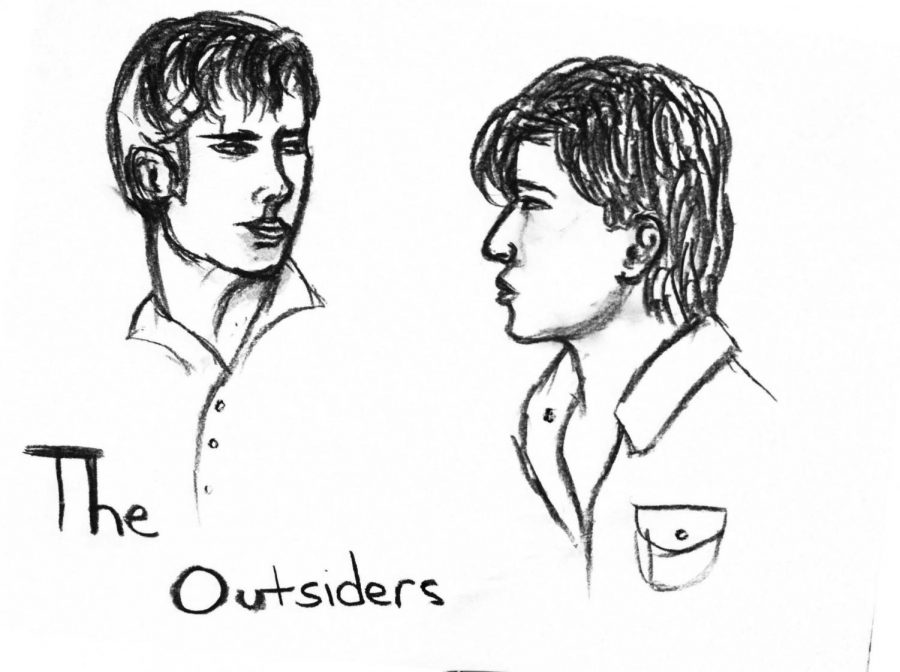Not all “broken familes” are broken
Think about all of the famous rebel characters: Jim Stark, John Bender, Johnny Strabler, Jyn Erso, Katniss Everdeen, Jughead Jones, and almost the entire group in “The Outsiders.”
Besides gallons of angst and disdain, they all have one thing in common: unfavorable home situations.
It is clear that media views these characters as damaged: absent fathers, divorced parents, deceased parents, alcohol and drug addicted mothers, abusive family. These situations are associated with punk or delinquent teens. This “rebel image” is what society has told children from a broken home what they are.
The United States is a nation where, according to the American Psychological Association, forty to fifty percent of marriages end in divorce. Not counting all of the other damaged forms of families, this leaves countless young individuals in a situations that aren’t ideal.
According to the stereotype, that means roughly every other teen out there should be wearing ripped jeans, sporting leather jackets, doping up, and spray painting under bridges.
Mr. Boguszewski, a health and physical education teacher at Eastern, comes from a difficult home situation himself and believes entertainment romanticizes these problems. “The media over-embellishes and every individual needs to overcome adversity and be resilient throughout their circumstances,” Boguszewski said.
The idea that all of these teens are designed to be delinquents couldn’t be further from the truth. While some do justify behavior such as drugs and alcohol with their home status, there are scores of people that effectively overcome a traumatic home.
Justin Timberlake, Jennifer Aniston, Johnny Depp, Emma Watson, Billie Joe Armstrong, Rihanna, Ronald Reagan, and Barack Obama all come from imperfect families of some sort and are considered extremely successful. The difference between those who become successful and those who fall into the pit of lost causes is their situation and personality. Those who can face the situation, make the best of it, and learn from it are likely to appear as though they never had problems at all.
The downside is that not all individuals are strong enough, in emotion or knowledge, to handle this very personal form of adversity. Some blame themselves or get caught trying to place the blame on someone else. That discontempt with their lives feed negative thoughts and can lead to a variety of effects in the children.
Harvard University Press studied this, and found that “teenagers in single-parent families and in blended families are 300% more likely to need psychological help within any given year then teens from intact, nuclear families.” They go on to say “children of divorced parents are twice as likely to dropout of high school than their peers who are still living with parents who did not divorce.”
These statistics may seem striking and overwhelming, but many of the individuals who lack the “nuclear family” are still able to adapt and move on. Arguably, the most difficult part of getting over it is finding a spouse and committing after witnessing their family’s situation.
Adults who come from an unideal home status said they experience great emotional tolls in finding partners, as they fear turning out like their parents. Commitment is one of the relationship factors that adults of divorce commonly claim as a problem. Experts agree that finding love as a child of separation is the most difficult part of growing up in that environment.
Contrary to this, others say that it forces an individual to learn and develop better morals. They won’t settle for friends or partners that are “okay.” In cases where there is a family tragedy, the outcome brings more grief than damage to a child. Traumatic events in youth often leave one in a mixed mental state that can push them towards a changed mental state.
The value of family itself is often distorted to people from a tough situation. The old saying “blood is thicker than water” means something entirely different to many. In fact, the real meaning of this phrase is the opposite of valuing family over others. The original version is “the blood of the the covenant is thicker than the water of the womb.”
Of the original line Megan Saunters, a student at the University of Washington explained, “The blood represented is not the blood shared by family, but rather actual blood shed by soldiers on the battlefield. Thus, the saying reflects that bloodshed between brothers of war makes for stronger bonds than those of the family you happened to be born into.”
Ultimately, it is the people one chooses to bring into his/her life that shapes them.
It is important to note that no two divorces, deaths, separations, or abusive situations are alike. Some families pull through and remain strong, hanging on to the best possible morals. Others are left in pieces. Some don’t talk at all. Teens in these predicaments should put in effort to adapt and overcome to their specific circumstances.
Caelie McFadden, a freshman at Eastern from a home that has been through a lot, said, “I will always remember the situations that shaped me, but I won’t let it define who I am.”
This is a motivational and effective mindset for teens facing any form of adversity.
Television and the silver screens will continue to portray teens from non-nuclear families as damaged goods. They are portrayed as beaten and battered into rebellion. The media owes it to everyone to shine a light







